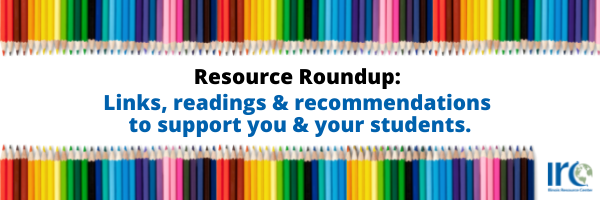This post is part of our ongoing “Language and Culture Lenses” series, where the IRC team discusses trends in education impacting our communities through language and cultural lenses, and how these conversations intersect with our vision of a world where every child’s languages and cultures are affirmed, every teacher’s practice is reflective and responsive, and every school’s systems and policies are inclusive and equitable. You can view the entire series here.
Currently, there is a lot of information out there about what is known as the Science of Reading and we encourage you to consider and question how this may or may not serve the students and communities in your care.
At the IRC, we uphold perspectives that value and affirm all learners in our culturally and linguistically diverse community. We champion systems, structures, and polices that holistically honor the language identities and literacy identities of all students we serve, and recognize that though students may carry the same label, each is an individual and there is rich diversity across the group. We favor perspectives that do not position any students as less-than or in need of fixing but rather, recognize and build on every student’s strengths to guide and shape their unique literacy journeys.
We believe in strong literacy practices that allow multilingual students to not only exist but thrive in literacy through:
- Honoring and leverage family and community funds of knowledge*
- Embracing students’ home/community/multilingual language practices and ways of knowing
- Providing windows and mirrors** to the many facets and intersections of human identity and lived experiences
- Attending to the interconnectedness of interpretive (viewing, listening, reading) and expressive (representing, writing, speaking) modes***
- Contextualizing the various components of literacy instruction (phonics, decoding, comprehension skills, fluency, writing, oracy, etc.) in authentic and integrated ways
- Acknowledging the various spaces and places where literacy lives: in whole group instruction, small group instruction, partnership with families, intentional collaborative moments, and the sometimes unanticipated sharing of ideas
- Empowering students with skills to make meaning of their own lives and the world
- Cultivating individual and collective agency toward continued growth and learning
[*Credited to Luis Moll; **Credited to Rudine Sims Bishop; ***WIDA 2020 Framework]
We are concerned that the concept known as Science of Reading is rooted in a monolingual perspective and therefore that the current zeal for this idea will lead practitioners to rigidly adhere to Science of Reading recommendations, deploying a one size fits all approach and neglecting the beautiful heterogeneity of our learning communities. We are concerned that a focus on Science of Reading will lead to a failure to attend to the practices we have outlined above, which we believe are essential for learning and love of literacy to thrive in our classrooms.
We are including a short list of resources to build your understanding about the Science of Reading, and again, we are always available to support you as you think through these issues. Let’s seek to ensure equitable access to high quality instruction and powerful educational experiences for everyone in our culturally and linguistically diverse community!
Unpack this piece, “The ‘bilingual brain’ and reading research: Questions about teaching English Learners to read in English” featured recently on Colorin Colorado (Spring 2023).
Dive into A Framework for Foundational Literacy Skills Instruction for English Learners Instructional Practice and Materials Considerations from the Council of Great City Schools (Spring 2023)
Read this piece from Bilingual Basics, the Newsletter of the Bilingual-Multilingual Education Interest Section (B-MEIS) of TESOL: Forging an Understanding of Reading Instruction for Multilingual Students in the Time of the SOR by Laura Ascenzi-Moreno (April 2023)
View this informal conversation amongst colleagues: Wind Down Wednesday Episode with IRC Specialists Carly Spina, Michele Yanong, and Rachell (Anderson) Plote (March 22, 2023)
Read this article from Education Week: The ‘Science of Reading’ and English-Language Learners: What the Research Says (April 21, 2022)
Check out this white paper: Toward Comprehensive Effective Literacy Policy and Instruction for English Learner/Emergent Bilingual Students as well as other research and resources from the National Committee for Effective Literacy (February 2022)



